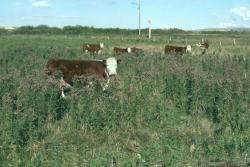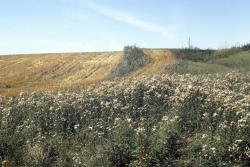About
About the Project
CREEP Stop: Integrating Biological, Cultural and Mechanical/Physical Tools for Long-term Suppression of Creeping Perennial Weeds in Northern Great Plains and Pacific Northwest Cropping Systems
 The goal of this multi-state NIFA OREI funded project is to develop integrated weed management tactics for suppression and control of Canada thistle and field bindweed across the U.S. Northern Great Plains and Pacific Northwest regions. Increasingly, fields in these regions are being removed from organic grain and lentil production because of a failure to prevent invasion and infestation by these two invasive weeds. In spite of the pernicious threat that these weed species pose to organic farmers, research targeting control and suppression tactics in organic environments is limited, and there has been no attempt to coordinate efforts regionally.
The goal of this multi-state NIFA OREI funded project is to develop integrated weed management tactics for suppression and control of Canada thistle and field bindweed across the U.S. Northern Great Plains and Pacific Northwest regions. Increasingly, fields in these regions are being removed from organic grain and lentil production because of a failure to prevent invasion and infestation by these two invasive weeds. In spite of the pernicious threat that these weed species pose to organic farmers, research targeting control and suppression tactics in organic environments is limited, and there has been no attempt to coordinate efforts regionally.
In this project, field experiments will be conducted on 10 commercial organic farms, 3 research centers, and one student-managed farm at a community college in each of four years. Various combinations of biological (e.g., grazing), cultural (e.g., crop sequence), and mechanical (e.g., mowing) tactics will be compared to identify those with greatest efficacy. Genotyping of weed populations and the microbial community at the weed/soil interface will be used to quantify the relationship between different control/suppression tactics, their effectiveness at control/suppression across weed populations, and their impact on soil microbial communities.
 Knowledge transfer of project results to organic farmers and other stakeholders will be accomplished through a combination of in-person and electronic outreach approaches. A webinar series on integrated weed management strategies for the control/suppression of Canada thistle and field bindweed in organic systems will be provided through eOrganic. Undergraduate and graduate students will get hands-on training and experience working on organic weed management tactics by participating on this project, by developing organic farming curricula where results of this project and integrated weed management strategies are discussed, and by enrollment in classes where project results are discussed. This project will have immediate impact on organic grain farmers in the northern Great Plains and Pacific Northwest, as well as other stakeholders who continue to struggle with control/suppression of Canada thistle and field bindweed, as well as other creeping perennial weed species.
Knowledge transfer of project results to organic farmers and other stakeholders will be accomplished through a combination of in-person and electronic outreach approaches. A webinar series on integrated weed management strategies for the control/suppression of Canada thistle and field bindweed in organic systems will be provided through eOrganic. Undergraduate and graduate students will get hands-on training and experience working on organic weed management tactics by participating on this project, by developing organic farming curricula where results of this project and integrated weed management strategies are discussed, and by enrollment in classes where project results are discussed. This project will have immediate impact on organic grain farmers in the northern Great Plains and Pacific Northwest, as well as other stakeholders who continue to struggle with control/suppression of Canada thistle and field bindweed, as well as other creeping perennial weed species.
Objectives
 In this project, we seek to enhance the economic and environmental sustainability of organic crop farming in the northern Great Plains and Pacific Northwest regions by developing integrated weed management approaches for effective suppression and control of Canada thistle and field bindweed.
In this project, we seek to enhance the economic and environmental sustainability of organic crop farming in the northern Great Plains and Pacific Northwest regions by developing integrated weed management approaches for effective suppression and control of Canada thistle and field bindweed.
Specific objectives are to:
(1) assess the diversity and spread of creeping perennials within fields and across environmental and organic management systems in the Northern Great Plains and Pacific Northwest regions
(2) identify which combination(s) of biological, cultural, and mechanical practices is(are) best suited for suppression/control of creeping perennials in organic grain and horticultural crop production systems
(3) share knowledge with organic farming stakeholders on the strategies and benefits ofusing integrated weed management approaches for effective suppression of creeping perennial weeds.
Funding

This project was funded in 2018 by the Organic Research and Extension Initiative grant, part of the USDA National Institute of Food and Agriculture. Grant number 2018-51300-28432
